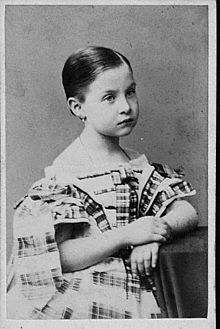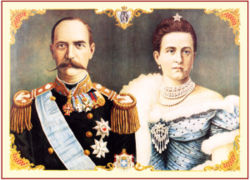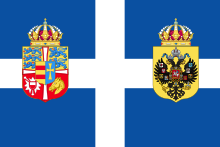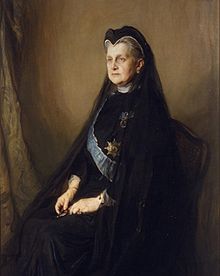- Olga Constantinovna of Russia
-
Olga Constantinovna of Russia 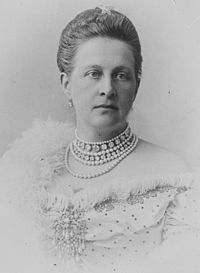
Queen consort of the Hellenes Tenure 27 October 1867 – 18 March 1913 Regent of Greece Tenure 17 November 1920 – 19 December 1920 Spouse George I of Greece Issue Constantine I of Greece
Prince George
Princess Alexandra
Prince Nicholas
Princess Marie
Princess Olga
Prince Andrew
Prince ChristopherHouse House of Schleswig-Holstein-Sonderburg-Glücksburg
House of Holstein-Gottorp-RomanovFather Grand Duke Konstantin Nikolayevich of Russia Mother Alexandra of Saxe-Altenburg Born 3 September 1851
PavlovskDied 18 June 1926 (aged 74)
Pau, BéarnBurial 17 November 1936
Royal Cemetery, Tatoi Palace, GreeceReligion Eastern Orthodox Grand Duchess Olga Constantinovna of Russia (Russian: Великая Княжна Ольга Константиновна), later Queen Olga of the Hellenes (Greek: Βασίλισσα Όλγα των Ελλήνων) (3 September [O.S. 22 August] 1851 – 18 June 1926), was the queen consort of King George I of Greece and briefly in 1920, Queen Regent of Greece. She is the great-grandmother of Queen Sofia of Spain, the paternal grandmother of Prince Philip, Duke of Edinburgh, and the great-grandmother of Charles, Prince of Wales, heir apparent to the British throne.
Contents
Early life
 Grand Duchess Olga Konstantinovna before her marriage.
Grand Duchess Olga Konstantinovna before her marriage.
She was born in Pavlovsk to Grand Duke Konstantin Nikolayevich of Russia and Grand Duchess Alexandra Iosifovna, a former princess of Saxe-Altenburg. She was a granddaughter of Tsar Nicholas I and first cousin of Tsar Alexander III. The young King George I of Greece visited Russia in 1863 to thank her uncle Tsar Alexander II for his support during George's election to the throne of Greece. Whilst there, George met the then twelve-year old Olga for the first time.[1]
George visited Russia again in 1867 to meet with his sister Dagmar, who had married Tsarevitch Alexander the year before. George and Olga fell in love and married on 27 October 1867 (Gregorian calendar), when she was sixteen years old.
Together George and Olga had eight children:
- Constantine (1868–1923), who succeeded his father as king;
- George (1869–1957), High Commissioner of Crete;
- Alexandra (1870–1891), married Grand Duke Paul Alexandrovich of Russia (son of Alexander II of Russia). Mother of Dmitri Pavlovich Romanov, assassin of Grigori Rasputin;
- Nicholas (1872–1938), married Grand Duchess Elena Vladimirovna of Russia;
- Marie (1876–1940), married first Grand Duke George Mikhailovich of Russia and second Pericles Ioannides;
- Olga (7 April 1880-2 November 1880);
- Andrew (1882–1944), father of Prince Philip, Duke of Edinburgh; and
- Christopher (1888–1940), father of Prince Michael of Greece.
Queen
Olga was a genuinely popular Queen and was extensively involved in charity work, endowing the Evangelismos (Annunciation) Hospital, Greece's largest, in downtown Athens, as well as a Russian hospital in Piraeus.[1]
In 1898, she insisted on continuing her engagements without a military guard even though shots had been fired at her husband and daughter.[1]
"Evangelika" controversy
Being an Orthodox Christian from birth, Queen Olga became aware, during visits to wounded servicemen in the Greco-Turkish War (1897), that many were unable to read the Bible. The version used by the Church of Greece included the Septuagint version of the Old Testament and the original Greek language version of the New Testament. Both were written in Koine Greek while her contemporaries used either Katharevousa or the so-called Demotic version of Modern Greek. Katharevousa was a formal language that contained archaicised forms of modern words, was purged of "non-Greek" vocabulary from other European languages and Turkish, and had a (simplified) archaic grammar. Modern or Demotic Greek was the version commonly spoken. Olga decided to have the Bible translated into a version which could be understood by most of her contemporary Greeks rather than those educated in Koine Greek. The translation was opposed by those who considered the translation "tantamount to a renunciation of Greece's 'sacred heritage'".[2]
In February 1901, the translation of the New Testament from Koine into Modern Greek that she had sponsored was published without the authorisation of the Greek Holy Synod. The price was set at one drachma, far below its actual cost, and the edition sold well. In order to mitigate opposition to the translation, both the old and new texts were included and the frontispiece specifically stated it was for "exclusive family use" rather than in church.[2]
At the same time, another translation was completed by Alexandros Pallis (1851–1935), a major supporter of a literary movement supporting the use of Demotic in written language. Publication of the translation started in serial form in the newspaper "Acropolis" on 9 September 1901. Almost immediately Purist theologians denounced this version as a "ridiculing of the nation's most valuable relics"[3] while a faction of the Greek press started accusing Pallis and his Demoticist supporters of blasphemy and treason.[2] Ecumenical Patriarch Joachim III of Constantinople denounced this translation, adding further fuel to the opposition.[3] Riots were started by students of the National and Kapodistrian University of Athens, who had been organized by conservative professors.[2] They requested the excommunication of Pallis and anyone involved with the translations, including Olga and Procopios, the Archbishop of Athens who had been a favorite of Olga and had supervised the translation after her personal request.
The conflict between rioters and troops, who had been called in to maintain order, resulted in eight deaths and over sixty people wounded. By December the remaining copies of Olga's translation had been confiscated and their circulation prohibited. Anyone selling or reading the translations was threated with excommunication.[2] The controversy was called the "Evangelika"", i.e. "the Gospels question", after the word "Evangelion", Greek for "Gospel", and ultimately led to the resignation of the Metropolitan bishop, Procopius, and the fall of the government of Georgios Theotokis.[4][5]
Regency
After her grandson, Alexander I died on 25 October 1920 of a monkey bite, the Greek government offered the throne to his brother, Paul. Paul refused on the grounds that his father Constantine and elder brother George were still living. The government of Eleftherios Venizelos was defeated in a general election and the Regent, Admiral Pavlos Kountouriotis retired on 17 November in favour of Queen Olga. She served as Regent until her son Constantine returned to take over the throne a second time on 19 December after a plebiscite. He had reigned before from 1913 to 1917. His new reign lasted less than two years.
After her death at Pau, Béarn, France, she was first interred in Italy (where the Greek Royal Family lived in exile), but on the restoration of the Greek monarchy in 1935 she was re-interred at Tatoi on 17 November 1936.[6]
Titles
- Her Imperial Highness Grand Duchess Olga Constantinovna of Russia (1851–1867)
- Her Majesty The Queen of the Hellenes (1867–1913)
- Her Majesty Queen Olga of Greece (1913–1926)
- Her Majesty The Queen Regent (1920)
Through her life in Greece (1867–1926) she was widely referred to as Her Majesty Queen Olga.
Ancestors
References
- ^ a b c The Times (London) Monday 21 June 1926 p.19 col.A
- ^ a b c d e Carabott, Philip (1993), "Politics, Orthodoxy and the Language Question in Greece: The Gospel Riots of November 1901" (pdf), Journal of Mediterranean Studies 3: 117–138, http://www.arts.yorku.ca/hist/tgallant/documents/carabottgospelriot_000.pdf, retrieved 22 January 2008
- ^ a b "The Struggle for a Bible in Modern Greek", The Watchtower (Watch Tower Bible and Tract Society of Pennsylvania), 15 November 2002, http://www.watchtower.org/e/20021115/article_01.htm, retrieved 22 January 2008
- ^ John Campbell and Philip Sherrard, Modern Greece (Ernest Benn, London, 1968) p.198
- ^ The Times (London) Tuesday 26 November 1901 p.9 col.C
- ^ Edward S Forster, A Short History of Modern Greece 1821–1956 3rd edition (Methuen and Co., London, 1958) p.198
External links
Olga Constantinovna of RussiaBorn: 3 September 1851 Died: 18 June 1926Greek royalty Preceded by
Amalia of OldenburgQueen consort of the Hellenes
27 October 1867 – 18 March 1913Succeeded by
Sophia of PrussiaGrand Duchesses of Russia 1st generation - Anna Petrovna, Duchess of Holstein-Gottorp
- Elizabeth
- Grand Duchess Natalia (Maria) Petrovna
- Grand Duchess Margarita Petrovna
- Grand Duchess Natalia Petrovna
- Anna
2nd generation 3rd generation none4th generation Grand Duchess Anna Petrovna5th generation 6th generation - Grand Duchess Maria Alexandrovna
- Grand Duchess Elizabeth Alexandrovna
- Maria Nicholaevna, Duchess of Leuchtenberg
- Olga Nicholaevna, Queen of Württemberg
- Grand Duchess Maria Mikhailovna
- Alexandra Nikolaevna, Princess Frederick William of Hesse-Cassel
- Yelizaveta Mikhaylovna, Duchess of Nassau
- Grand Duchess Elizabeth Nicholaevna
- Catherine Mikhailovna, Duchess George Augustus of Mecklenburg-Strelitz
- Grand Duchess Anna Mikhailovna
7th generation - Grand Duchess Alexandra Alexandrovna
- Olga Constantinovna, Queen of the Hellenes
- Maria Alexandrovna, Duchess of Saxe-Coburg and Gotha
- Anastasia Mikhailovna, Grand Duchess of Mecklenburg-Schwerin
8th generation 9th generation 10th generation - * title granted by Grand Duke Cyril Vladimirovich
- ** title granted by Grand Duke Vladimir Cyrillovich
Anne-Marie of Denmark (1964-1974)
Frederica of Hanover (1947-1964) · Elisabeth of Romania (1922-1924) · Aspasia Manos (1919-1920) · Sophia of Prussia (1913-1917; 1920-1922) · Olga Constantinovna of Russia (1867–1913) · Amalia of Oldenburg (1836-1862)Heads of state of Greece  1st Republic (1827–1832)
1st Republic (1827–1832) Monarchy (1832–1924)Otto · Regency Council · George I · Constantine I · Alexander · Pavlos Kountouriotis1 · Queen Olga1 · Constantine I · George II
Monarchy (1832–1924)Otto · Regency Council · George I · Constantine I · Alexander · Pavlos Kountouriotis1 · Queen Olga1 · Constantine I · George II 2nd Republic (1924–1935)
2nd Republic (1924–1935) Monarchy (1935–1974)
Monarchy (1935–1974) Military Junta (1967–1974)
Military Junta (1967–1974) 3rd Republic (since 1974)4
3rd Republic (since 1974)41 Regent or interim President. 2 Appointed by military regime. 3 Fled Greece on 13 December 1967. De jure head of state until the abolition of the monarchy in 1973/1974. 4 The 1973–1974 junta-proclaimed Republic is not officially recognised. Categories:- 1851 births
- 1926 deaths
- Russian grand duchesses
- Female regents
- House of Holstein-Gottorp-Romanov
- House of Glücksburg (Greece)
- Greek queens consort
- Burials at Tatoi Palace Royal Cemetery
- Modern Greek language
- Regents of Greece
- Russian people of German descent
- Greek people of Russian descent
- Greek people of German descent
Wikimedia Foundation. 2010.

